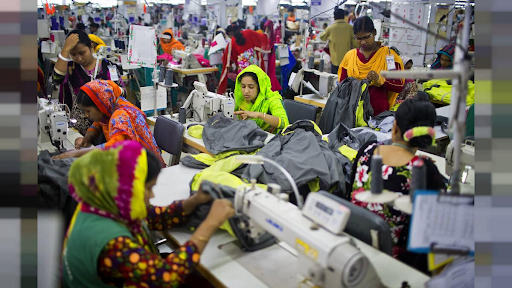Fast Fashion Has Consumed Society

A fast fashion clothing production factory in Bangladesh is pictured where employees are paid unfair wages and forced to work continuously for hours without breaks.
The rise of stores such as Shein has spurred a new generation of consumerism and fast fashion which has dire social and environmental consequences. The extreme profits made by businesses in the fast fashion industry encourage other apparel-makers to move towards producing unethically for financial gains. Consumers need to be less incentivized to purchase clothing from fast fashion brands by recognizing the cheap quality of materials used to make the clothing, the poor working conditions faced by laborers, and the constant changing of trends that leading consumers on a wild goose chase of trends that will forever elude them.
The clothing produced in fast fashion factories is often created in rapid time with cheap materials to ensure the clothes will be sold before a new trend takes place. As a result, the clothes are produced at a low cost to the retailers which in turn offsets the retail price for consumers. Creating clothes from high-quality textiles such as cotton is expensive so many fast fashion brands resort to textiles such as polyester that are created from petrochemicals. These textiles include polyester which sheds microplastics and according to a study conducted by the International Union for Conservation of Nature, petrochemical textiles are responsible for nearly 35 percent of the microplastics in the ocean. Microplastics are very small and do not get filtered which leads to them being consumed by marine wildlife and consequently, into human bodies of those who eat fish. These petrochemical textiles are toxic and extremely harmful for wildlife and consumers who are often unaware of the impacts of their apparel purchases. Some studies have even found that the synthetic materials used by fast fashion brands are carcinogenic and harmful for the human skin further demonstrating the need to stop buying into fast fashion.
Although the use of cheap materials brings down production costs significantly, it is not the only means of doing so. Many apparel companies will also utilize unethical practices such as labor exploitation and low wages. Many fast fashion brands are based in western countries but outsource their labor because it is cheaper and easier for them to avoid prosecution for treatment of their workers in developing countries. Laborers in these factories are in dire financial situations and cannot leave their jobs so they are often forced to put up with emotional, physical, and sexual violence according to testimonies collected by the Global Labor Justice. These employees are also compensated with wages that are barely enough to sustain themselves but they have no other skills that they can market for higher-paying jobs. Consumers must realize that their shopping spree at H&M is indirectly contributing to the labor exploitation of workers in a foreign country where people aren’t as privileged.
Fashion trends are constantly changing which further incentivizes companies to continue mass-producing cheap clothing at fast rates for consumers to purchase and keep up with trends. A study published by the International Journal of Consumer Studies found that a fashion trend describes clothing that is worn at most 10 times. Even if fast fashion clothing is produced more sustainably, the utilization of the clothing will still be poor and consumers will not wear it enough to make it worth it. To avoid the negative implications of fast fashion, consumers must avoid purchasing clothing considered to be fast fashion altogether. This will force retailers to stop producing clothing that only has a short period of wearability and instead, produce apparel that is classy and consumers can wear for years to come.
Many consumers justify buying into the fast fashion industry by claiming that it is affordable and allows them to feel confident in their attire without breaking the bank. However, purchasing clothes at a slightly higher cost will allow them to build a lasting wardrobe made of quality materials and save them money in the long run. Shein, H&M, and Zara are well known for selling basic and trendy clothing that is far cheaper than purchasing from an ethical brand but consumers must realize the ethical cost of their purchase. Additionally, these brands lower costs by making them from petrochemicals as described before which shed over time and are not everlasting. Consumers must consider investing a little more money into their clothing to create a wardrobe that does not reflect all fashion trends and is made from ethical brands. They will not only be saving themselves money in the long run but also feel better about maintaining their moral code.
The fast fashion industry is growing rapidly and consumers play a large role in slowing down the industry by not purchasing clothes made by fast fashion brands. They must change their fashion habits and resort to buying clothes that are timeless and produced ethically which will directly benefit them.











